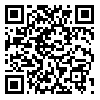Volume 12, Issue 5 (September & October 2021)
BCN 2021, 12(5): 703-710 |
Back to browse issues page
Download citation:
BibTeX | RIS | EndNote | Medlars | ProCite | Reference Manager | RefWorks
Send citation to:



BibTeX | RIS | EndNote | Medlars | ProCite | Reference Manager | RefWorks
Send citation to:
Karimi N, Boostani R, Fatehi F, Panahi A, Okhovat A A, Ziaadini B, et al . Guillain-Barre Syndrome and COVID-19 Vaccine: A Report of Nine Patients. BCN 2021; 12 (5) :703-710
URL: http://bcn.iums.ac.ir/article-1-2223-en.html
URL: http://bcn.iums.ac.ir/article-1-2223-en.html
Narges Karimi1 

 , Reza Boostani2
, Reza Boostani2 

 , Farzad Fatehi3
, Farzad Fatehi3 

 , Akram Panahi3
, Akram Panahi3 

 , Ali Asghar Okhovat3
, Ali Asghar Okhovat3 

 , Bentolhoda Ziaadini4
, Bentolhoda Ziaadini4 

 , Keivan Basiri5
, Keivan Basiri5 

 , Siamak Abdi3
, Siamak Abdi3 

 , Farnaz Sinaei3
, Farnaz Sinaei3 

 , Mojtaba Rezaei3
, Mojtaba Rezaei3 

 , Gholamreza Shamsaei6
, Gholamreza Shamsaei6 

 , Behnaz Ansari5
, Behnaz Ansari5 

 , Shahriar Nafissi *3
, Shahriar Nafissi *3 




 , Reza Boostani2
, Reza Boostani2 

 , Farzad Fatehi3
, Farzad Fatehi3 

 , Akram Panahi3
, Akram Panahi3 

 , Ali Asghar Okhovat3
, Ali Asghar Okhovat3 

 , Bentolhoda Ziaadini4
, Bentolhoda Ziaadini4 

 , Keivan Basiri5
, Keivan Basiri5 

 , Siamak Abdi3
, Siamak Abdi3 

 , Farnaz Sinaei3
, Farnaz Sinaei3 

 , Mojtaba Rezaei3
, Mojtaba Rezaei3 

 , Gholamreza Shamsaei6
, Gholamreza Shamsaei6 

 , Behnaz Ansari5
, Behnaz Ansari5 

 , Shahriar Nafissi *3
, Shahriar Nafissi *3 


1- Immunogenetics Research Center, School of Medicine, Mazandaran University of Medical Sciences, Sari, Iran.
2- Department of Neurology, School of Medicine, Mashhad University of Medical Sciences, Mashhad, Iran.
3- Department of Neurology, Shariati Hospital, Tehran University of Medical Sciences, Tehran, Iran.
4- Department of Neurology, Kerman Neuroscience Research Center, Kerman University of Medical Science, Kerman, Iran.
5- Department of Neurology, School of Medicine, Isfahan University of Medical Sciences, Isfahan, Iran.
6- Neurology Department, Ahvaz Jundishapur University of Medical Sciences, Ahvaz, Iran.
2- Department of Neurology, School of Medicine, Mashhad University of Medical Sciences, Mashhad, Iran.
3- Department of Neurology, Shariati Hospital, Tehran University of Medical Sciences, Tehran, Iran.
4- Department of Neurology, Kerman Neuroscience Research Center, Kerman University of Medical Science, Kerman, Iran.
5- Department of Neurology, School of Medicine, Isfahan University of Medical Sciences, Isfahan, Iran.
6- Neurology Department, Ahvaz Jundishapur University of Medical Sciences, Ahvaz, Iran.
Abstract:
Introduction: Guillain-Barre Syndrome (GBS) is an autoimmune acute inflammatory demyelinating polyneuropathy usually elicited by an upper respiratory tract infection. Several studies reported GBS associated with Coronavirus Disease 2019 (COVID-19) infection. In this study, we described nine GBS patients following the COVID-19 vaccine.
Methods: In this study, nine patients were introduced from six referral centers for neuromuscular disorders in Iran between April 8 and June 20, 2021. Four patients received the Sputnik V, three patients received the Sinopharm, and two cases received the AstraZeneca vaccine. All patients were diagnosed with GBS evidenced by nerve conduction studies and/or cerebrospinal fluid analysis.
Results: The median age of the patients was 54.22 years (ranged 26-87 years), and seven patients were male. The patients were treated with Intravenous Immunoglobulin (IVIg) or Plasma Exchange (PLEX). All patients were discharged with some improvements.
Conclusion: The link between the COVID-19 vaccine and GBS is not well understood. Given the prevalence of GBS over the population, this association may be coincidental; therefore, more studies are needed to investigate a causal relationship.
Methods: In this study, nine patients were introduced from six referral centers for neuromuscular disorders in Iran between April 8 and June 20, 2021. Four patients received the Sputnik V, three patients received the Sinopharm, and two cases received the AstraZeneca vaccine. All patients were diagnosed with GBS evidenced by nerve conduction studies and/or cerebrospinal fluid analysis.
Results: The median age of the patients was 54.22 years (ranged 26-87 years), and seven patients were male. The patients were treated with Intravenous Immunoglobulin (IVIg) or Plasma Exchange (PLEX). All patients were discharged with some improvements.
Conclusion: The link between the COVID-19 vaccine and GBS is not well understood. Given the prevalence of GBS over the population, this association may be coincidental; therefore, more studies are needed to investigate a causal relationship.
Type of Study: Original |
Subject:
Clinical Neuroscience
Received: 2021/07/11 | Accepted: 2021/09/4 | Published: 2021/09/1
Received: 2021/07/11 | Accepted: 2021/09/4 | Published: 2021/09/1
Send email to the article author
| Rights and permissions | |
 |
This work is licensed under a Creative Commons Attribution-NonCommercial 4.0 International License. |





